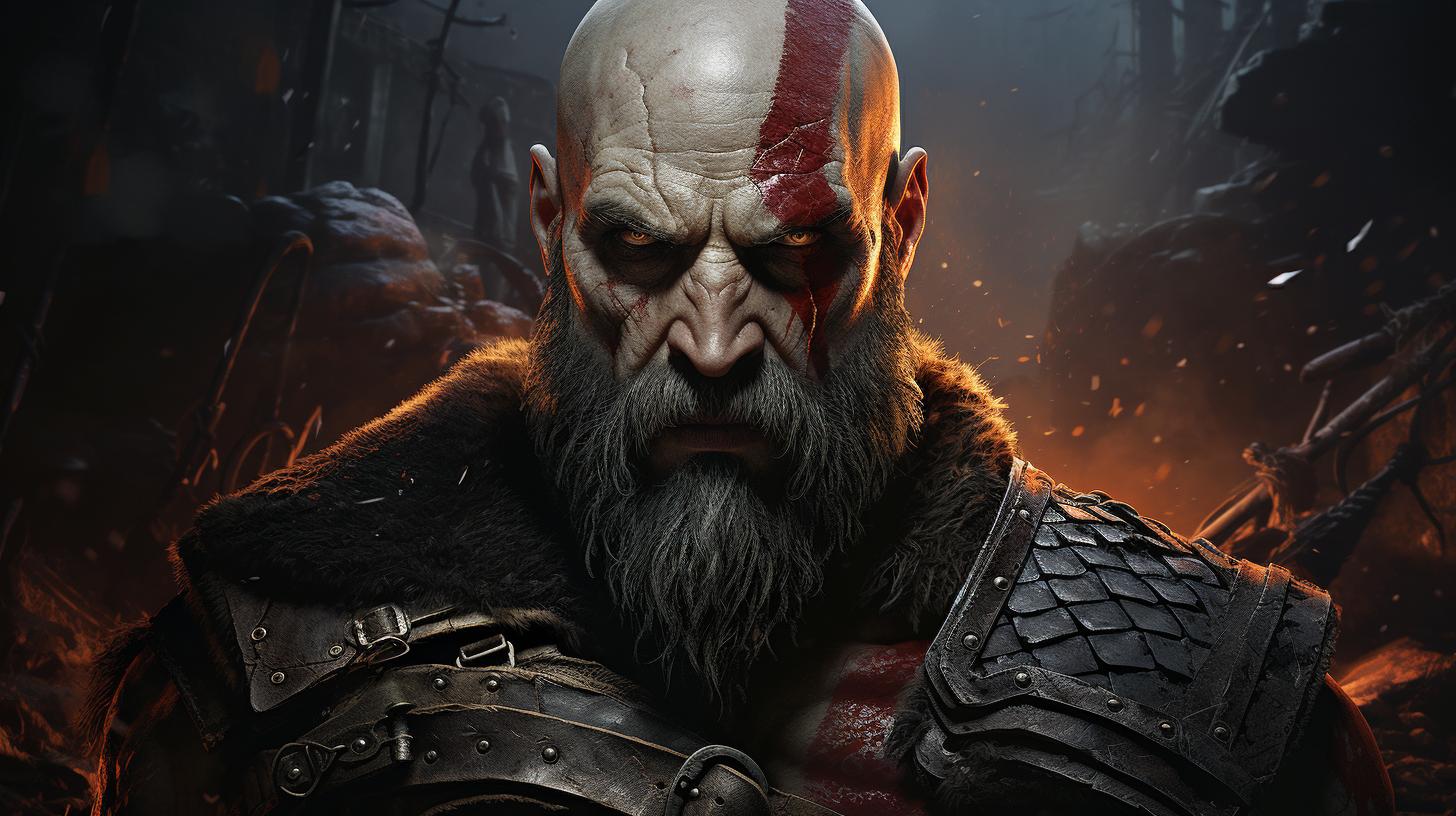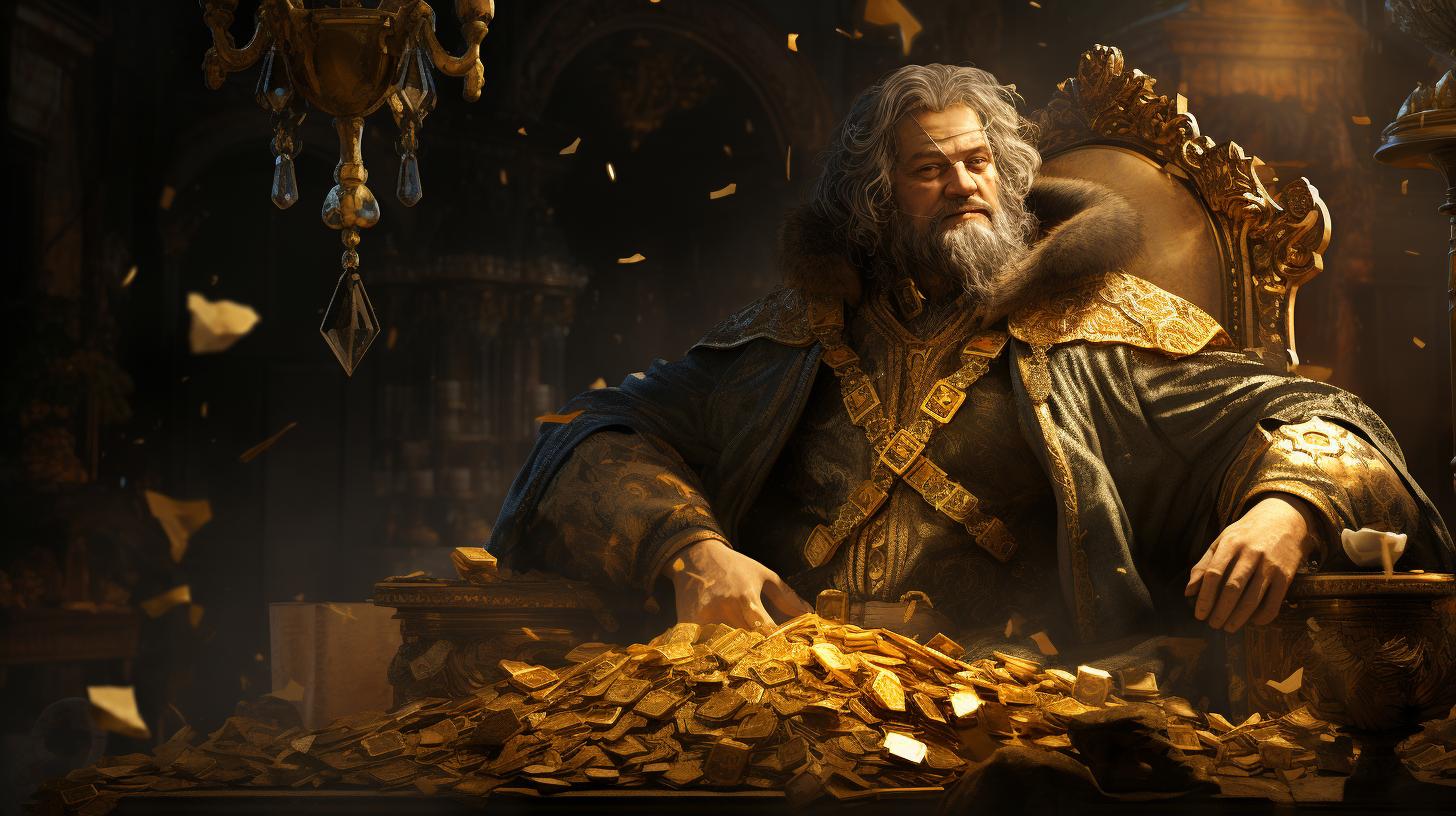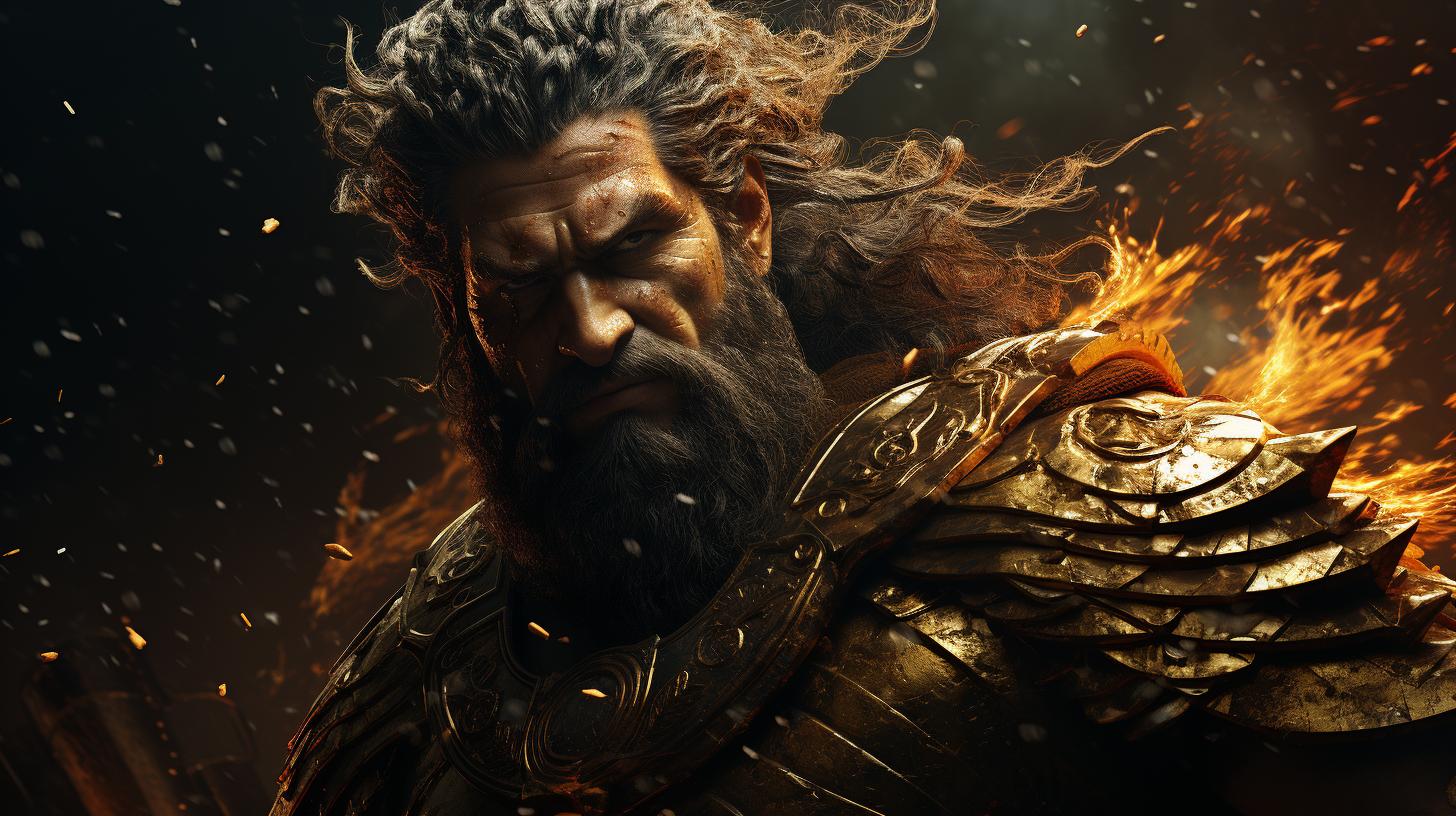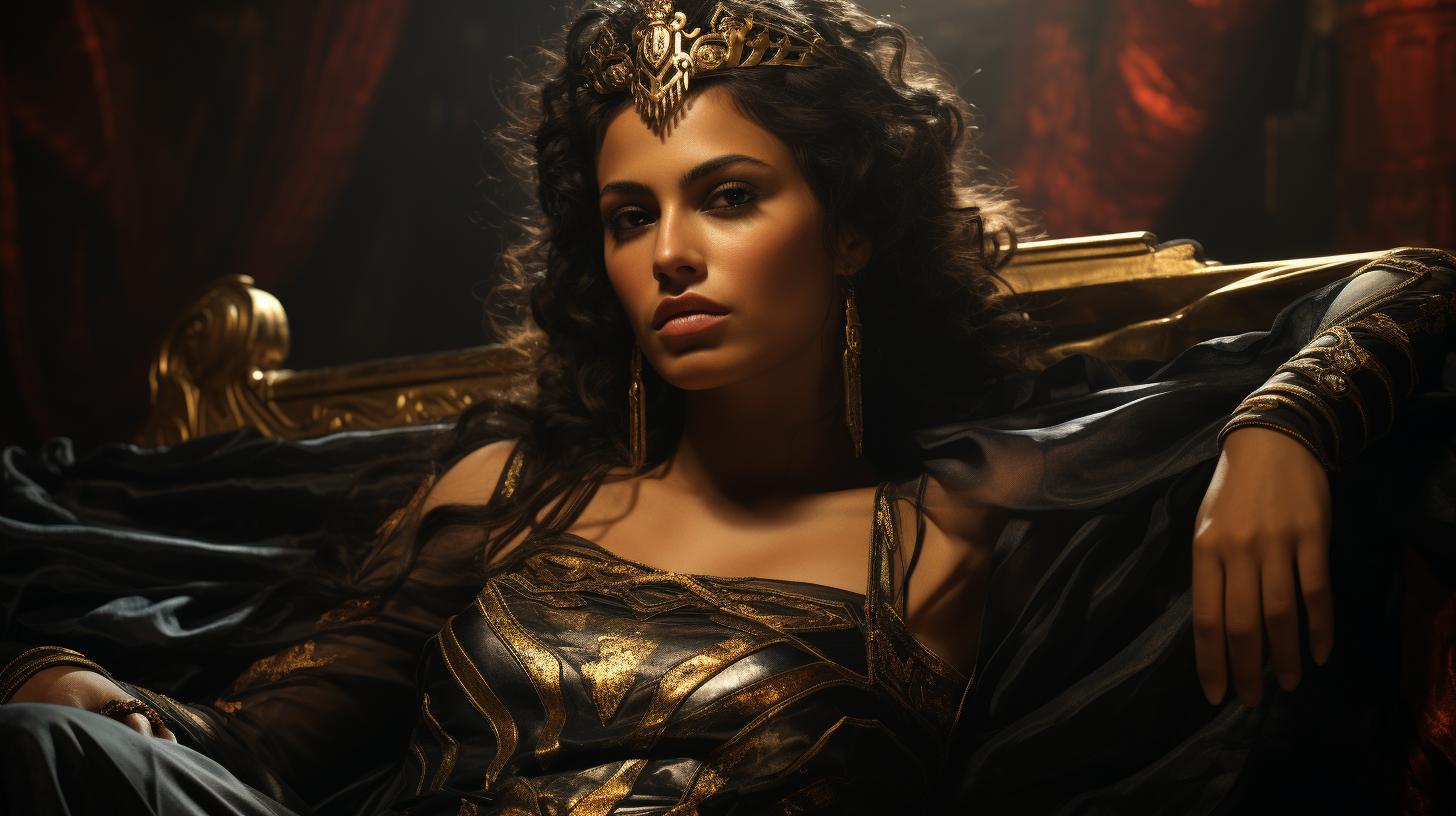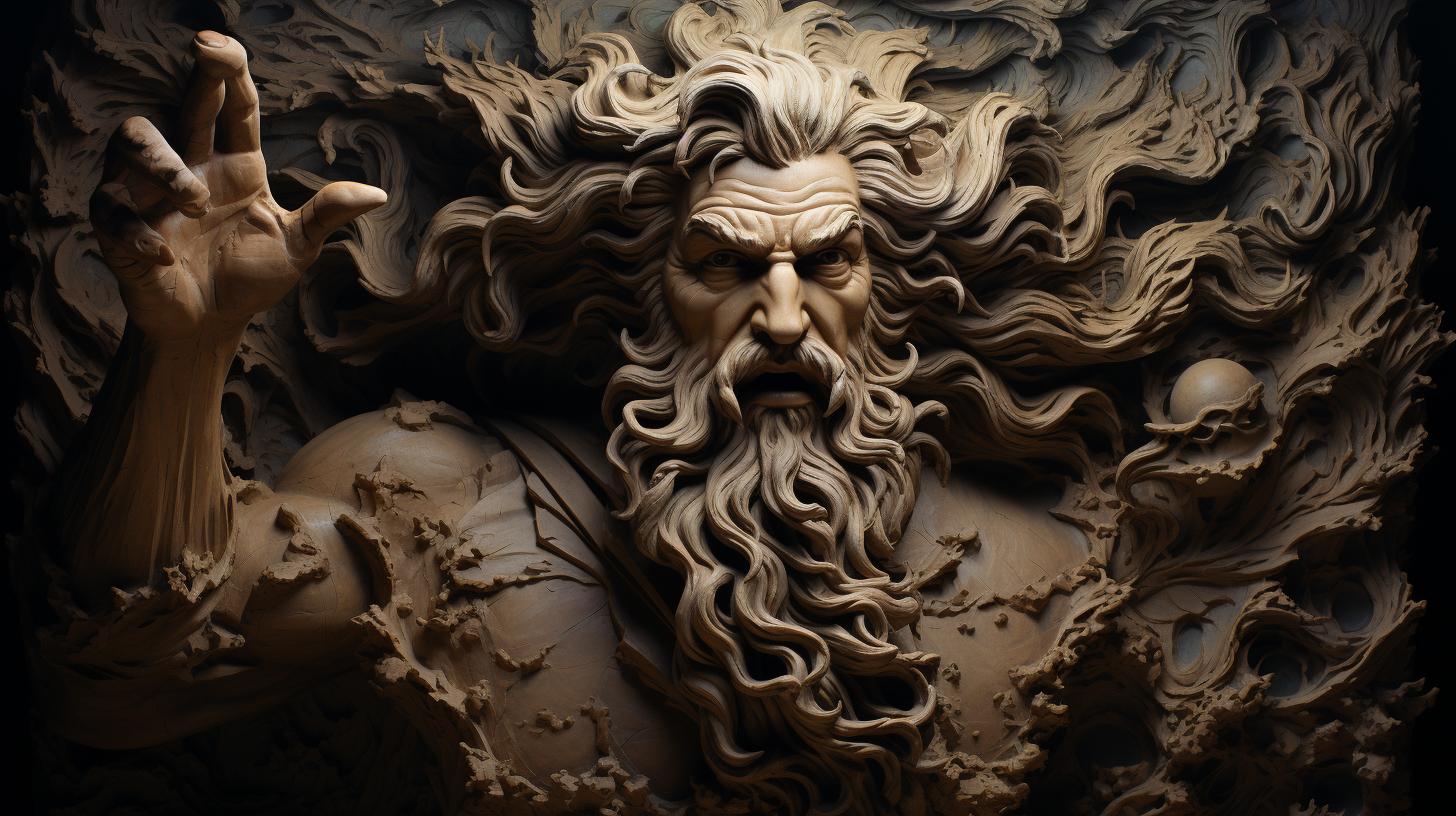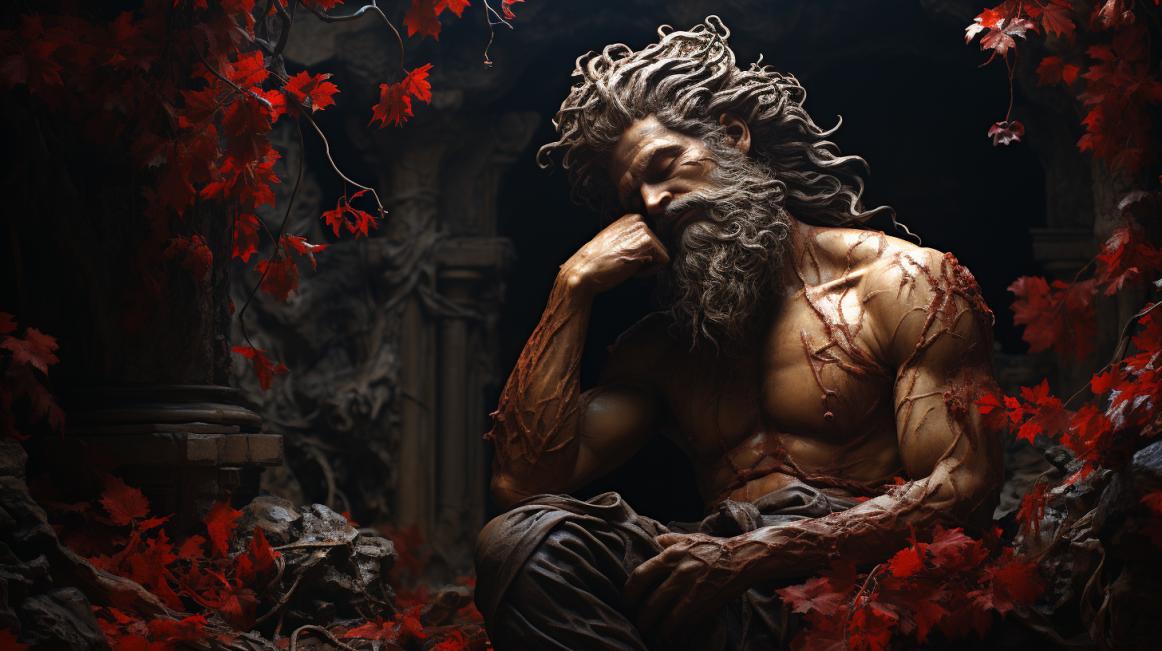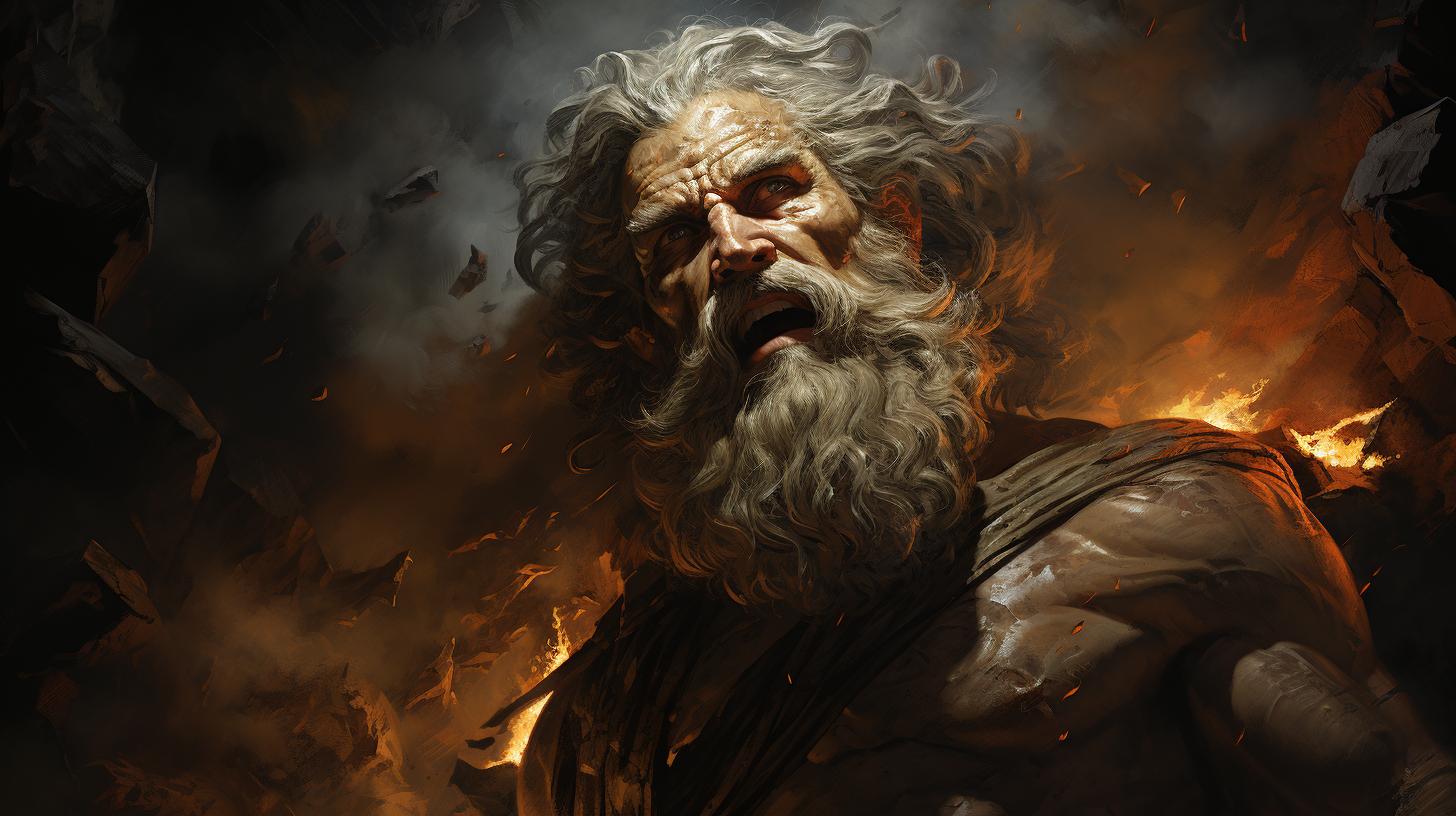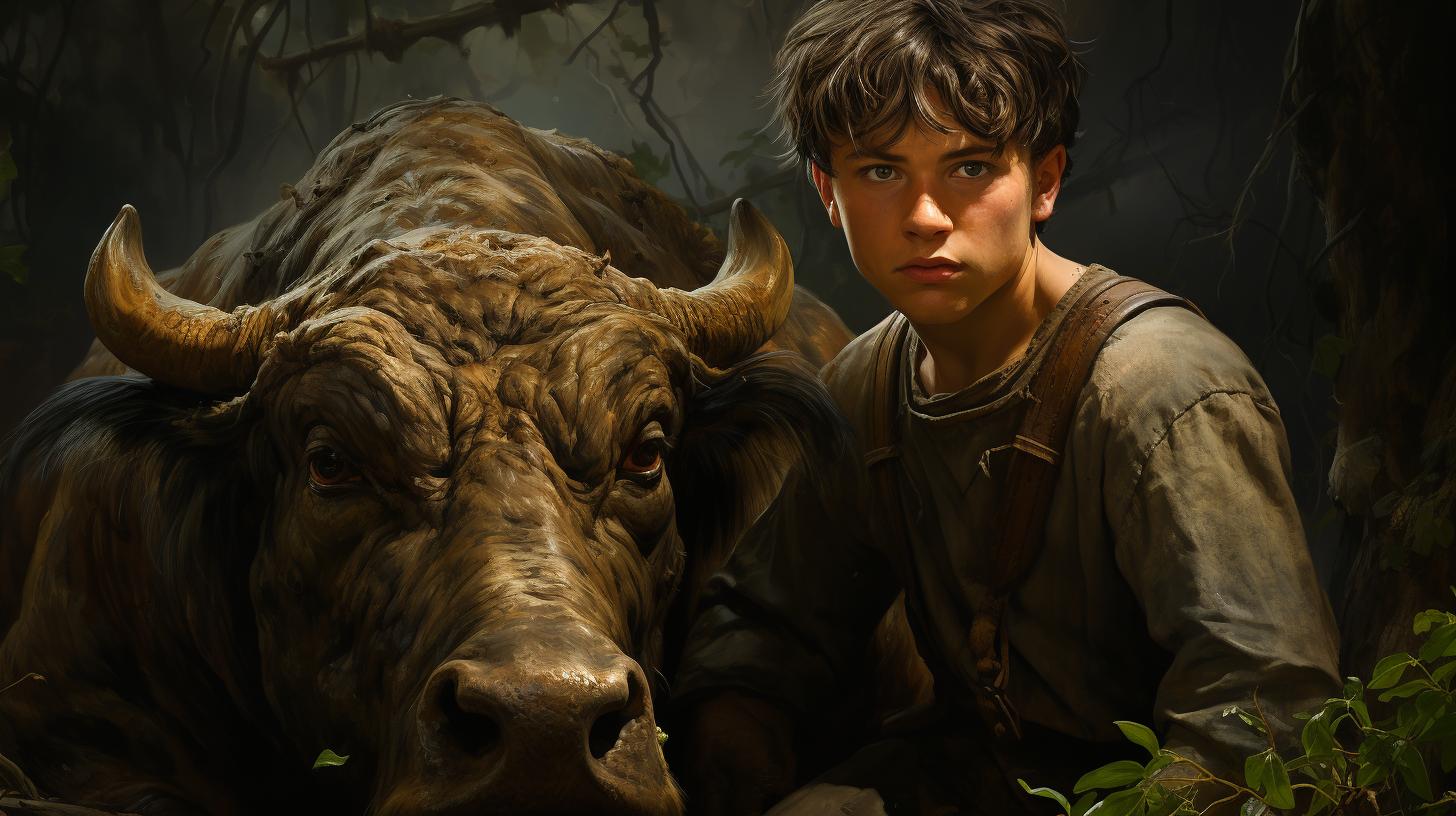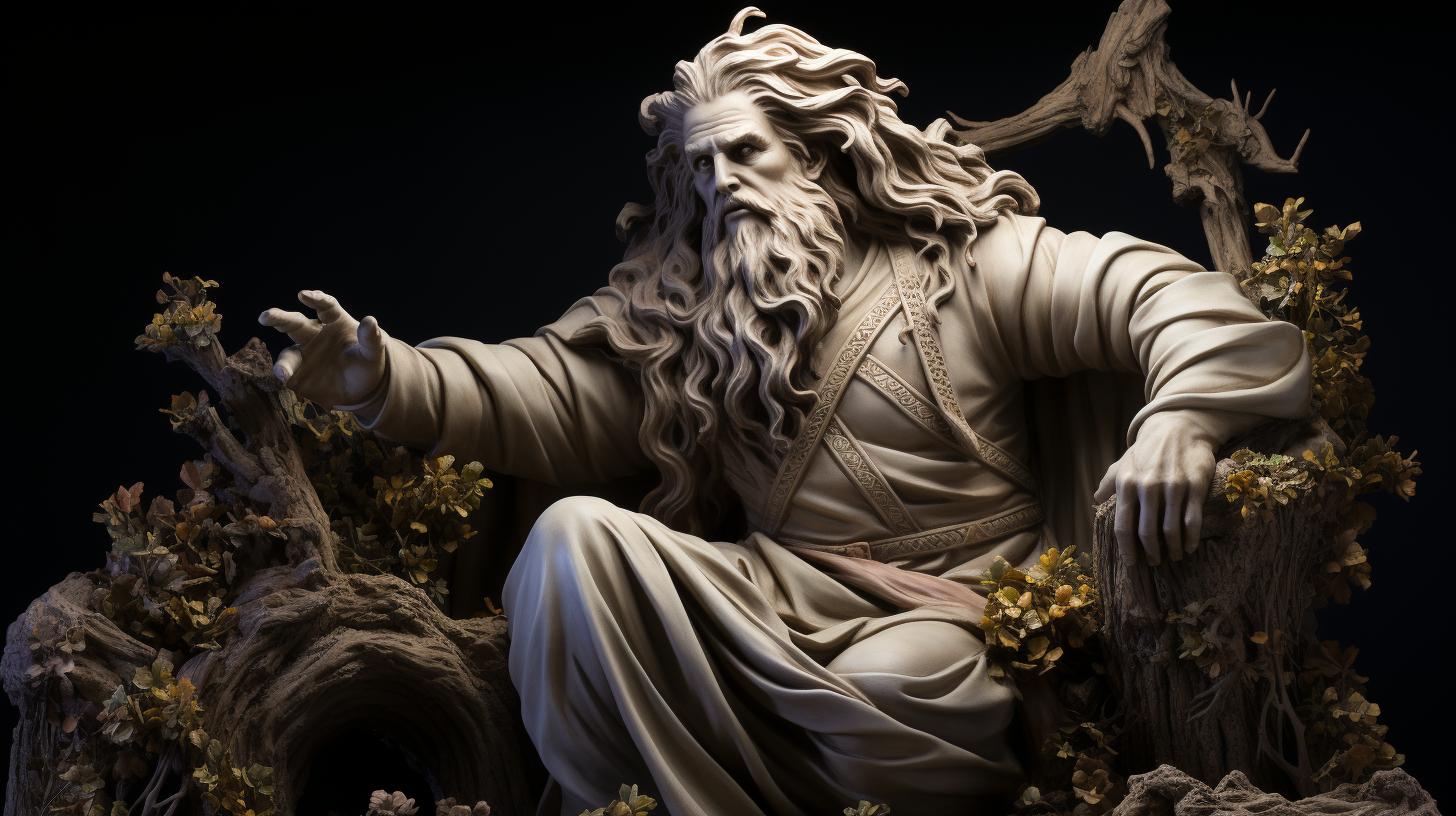Kratos in Real Greek Mythology: Unveiling the True Legend and Its Impact
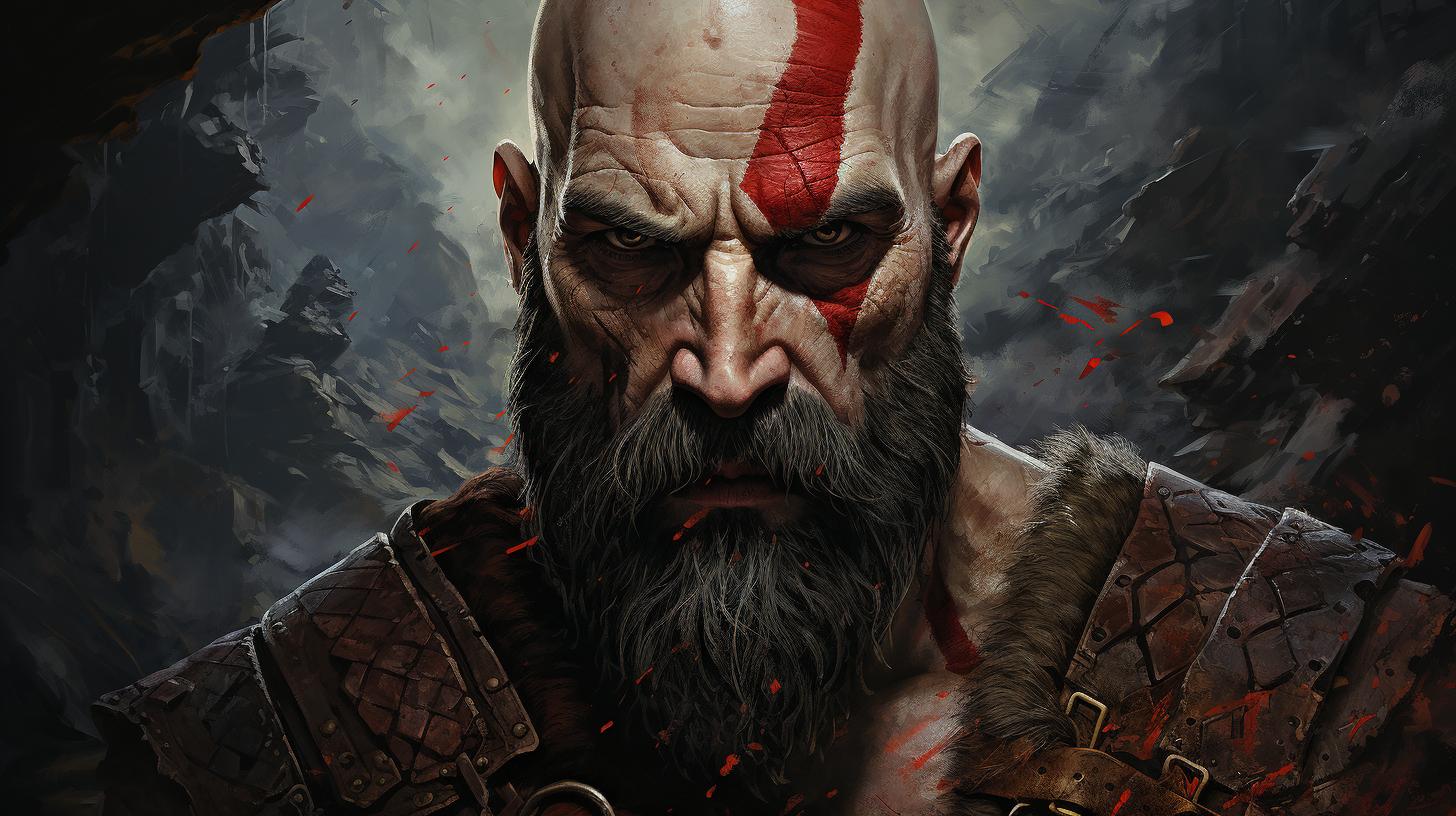
Kratos is a captivating figure in Greek mythology, originating from the powerful lineage of deities. His mythological portrayal differs from his depiction in the God of War game series, where he stands as an anti-god figure on a vengeful path.
This article delves into the origins of Kratos in real Greek mythology, exploring his family, powers, and role in ancient tales. It also examines the game developers’ narrative choices and the influence of other Greek heroes on Kratos’ character.
Discover the impact Kratos has left on the gaming industry and its devoted fans.
The Mythology Behind Kratos: Exploring the Greek Origins
Delve into the captivating world of Greek mythology as we unravel the fascinating origins of Kratos. In Greek mythology, Kratos holds an intriguing place as a divine personification of strength and power.
Born as one of the children of the Titan Pallas and the goddess Estigia, Kratos embodies the force and might revered by the ancient Greeks.
His name, derived from the Greek word “kratos” meaning power or strength, reflects his innate nature.
Kratos is often depicted as a strong and intimidating figure, a warrior who personifies the relentless pursuit of victory and dominance.
Unlike his portrayal in the God of War game series, Kratos in Greek mythology is not defined by his anti-god stance or his vendetta against Zeus. Instead, he represents the embodiment of strength that was revered and feared in the ancient Greek pantheon.
Within the rich tapestry of Greek mythology, Kratos’ role was not limited to his might alone. He served as a divine enforcer, carrying out the will of the gods and maintaining order in the mortal realm.
His authority and power were renowned, as he was entrusted with ensuring the dominance of the gods and enforcing their rule.
As we explore the varied myths and legends surrounding Kratos, we uncover the stories of his interactions with other prominent deities and heroes.
His connections with figures such as Zeus, Prometheus, and even his siblings reveal the complexity of Kratos’ character within Greek mythology.
Join us on this journey through ancient Greece as we delve into the mythology behind Kratos, revealing the intricate tapestry of tales that have captivated generations and left an indelible mark on the world of mythology.
Kratos and His Role in Greek Mythology
One cannot explore the realm of Greek mythology without encountering the formidable figure of Kratos. In Greek mythology, Kratos holds a significant role as a divine personification of strength and power.
Born from the Titans Pallas and Styx, he embodies the force that governs dominance and authority.
However, Kratos’ role in Greek mythology transcends mere physical strength. He embodies the concept of relentless determination and unwavering loyalty to his duties.
In ancient tales, Kratos is often portrayed as a faithful servant and enforcer of Zeus, the King of the Gods. His unwavering commitment to his duty is exemplified by his involvement in carrying out Zeus’ orders, even at the cost of inflicting harm upon others.
As the personification of strength and authority, Kratos plays a crucial role in maintaining the divine balance and order in Greek mythology. His actions serve as a reminder of the consequences faced by those who defy the will of the gods.
Kratos represents the disciplinary aspect of the divine realm, enforcing the authority of the gods and ensuring that mortals uphold their obligations and submit to the divine will.
Throughout Greek mythology, Kratos emerges as a powerful and respected figure, earning the admiration of gods and mortals alike.
His actions symbolize the consequences of challenging the divine order and serve as a cautionary tale for those who dare to defy the gods.
- Embodies the force and power of the divine realm
- Unwavering loyalty and commitment to enforcing Zeus’ authority
- Maintains divine balance and order
- Punishes those who challenge the will of the gods
- Symbolizes the consequences of defying the divine order
The Family of Kratos: Siblings and Relationships
In Greek mythology, Kratos is not only known for his immense strength and power but also for his intricate familial relationships.
As the son of the Titan Pallas and the goddess Estigia, Kratos has siblings who play significant roles in Greek mythology.
- Bia: Kratos’ sister, known as the personification of force and raw energy.
Bia embodies brute strength and is deeply loyal to Zeus, often assisting him in enforcing his authority.
- Zelus: Another sibling of Kratos, Zelus personifies zeal and rivalry. He is often depicted as a fierce and competitive god, who stands alongside Bia in serving Zeus.
- Nike: The sister of Kratos, Bia, and Zelus, Nike represents victory.
She is often portrayed as a winged goddess, symbolizing the glorious triumphs achieved by the gods.
These siblings, together with Kratos, embody various aspects of power, strength, and determination. They form a formidable force within Greek mythology, influencing the dynamics and conflicts among the gods.
While Kratos’ relationship with his siblings is not extensively explored in the God of War game series, their existence in Greek mythology adds depth to his character. The bond between Kratos and his siblings underscores the intricate web of family connections that shape the world of Greek gods and goddesses.
Throughout Greek mythology, family relationships play a crucial role, highlighting the complexities of divine kinship and the power struggles that ensue. The inclusion of Kratos’ siblings provides a glimpse into the intricate tapestry of relationships that define the realm of the gods.
Unraveling the Power and Deity of Kratos
As we delve deeper into Kratos’ character, we begin to understand the immense power and divine nature that he possesses. In Greek mythology, Kratos is depicted as a personification of strength and is one of the offspring of the Titan Pallas and Estige, the river of the Underworld.
His unparalleled might and relentless determination make him a formidable force.
Unlike his mythological counterpart, the Kratos portrayed in the God of War games showcases an even greater intensity and godlike abilities.
His raw strength and combat prowess are magnified, making him a true force to be reckoned with. Throughout the games, Kratos displays powers such as superhuman strength, durability, and the ability to harness magical artifacts and weapons.
Not only does Kratos possess extraordinary physical attributes, but he also exhibits a deep connection to the divine realm. As the Ghost of Sparta, he ascends to become the God of War himself, drawing authority from his position and intensifying his already immense power.
This transformation solidifies his status as a deity and reinforces his role as an instrument of warfare.
Kratos’ unrivaled power and divine essence make him a central figure in the Greek mythological pantheon.
He becomes an embodiment of conflict and vengeance, embodying the wrath and relentless pursuit of justice against those who seek to suppress him. His deific nature grants him the authority to challenge, and ultimately face off against, the mighty Zeus, the king of the gods.
The Power of the Blades of Chaos
One of the most iconic symbols of Kratos’ power is the Blades of Chaos, weapons forged in madness and infused with his own torment. These dual blades, attached to his forearms by chains, unleash devastating attacks capable of tearing through enemies with ease.
The Blades of Chaos tap into his fiery rage, amplifying his strength and unleashing powerful elemental attacks.
Through the unpredictable and ferocious nature of the Blades of Chaos, Kratos showcases his relentless determination to exact vengeance upon those who have wronged him.
Beyond their physical might, the blades also serve as a constant reminder of his dark past and the sacrifices he made to achieve his current state of power.
The Power of the Blades of Chaos is a testament to Kratos’ indomitable spirit, as he wields them with unmatched precision and brutality.
With every swing and strike, he further solidifies his position as a force that cannot be ignored, an embodiment of abstract concepts like retribution and the consequences of defiance.
The Wrath of Kratos: Unleashing His Divine Fury
Kratos’ power transcends the mortal realm, and nowhere is this more apparent than in his ability to tap into his divine fury.
As the God of War, he harnesses his boundless rage to activate devastating special attacks, capable of decimating entire armies and challenging even the mightiest gods. These attacks are a reflection of his indomitable will and the culmination of his immense power.
His divine fury manifests in various forms, from summoning gigantic creatures and elemental forces to channeling energy into explosive strikes. Kratos’ furious wrath becomes a force of nature itself, leaving a path of destruction in his wake.
This divine power not only sets him apart from mere mortals but also showcases his inherent connection to the realms of gods and mythical beings.
The unrestrained power and deity of Kratos make him a fearsome and captivating character.
His ability to tap into his divine essence and unleash his wrath makes him a force that commands attention and respect. Kratos’ journey is a testament to the enduring power of Greek mythology and its ability to captivate audiences even in the modern era of video games.
Kratos in the God of War Game: A Powerful and Complex Character
Within the beloved God of War game series, Kratos emerges as a dynamic and multi-faceted character. He captivates players with his awe-inspiring power, relentless determination, and complex emotions. As the central protagonist, Kratos embodies the essence of a fierce warrior seeking redemption and revenge in the brutal world of Greek mythology.
From the very beginning, players are drawn into Kratos’ harrowing journey as he battles gods, monsters, and his own inner demons. What sets Kratos apart is his unyielding strength and unwavering resolve to confront the gods who have wronged him.
His imposing physical presence commands attention, while his actions constantly remind us of the turmoil he carries within.
In the realm of Greek mythology, Kratos’ role goes beyond simply being a “Dios de la Guerra.”
He defies traditional notions of heroism and righteousness, embodying a more complex and morally ambiguous character. Kratos is driven by a deep-seated anger, shaped by past betrayals and personal loss. This emotional depth and psychological complexity make him a fascinating and relatable figure for players to explore.
Throughout the game series, players witness Kratos’ evolution as he grapples with guilt, remorse, and the weight of his own choices. He navigates a treacherous path, torn between the desire for vengeance and the responsibility to protect those he cares about.
This internal conflict adds layers of depth to Kratos’ character, spurring players to question their own perceptions of right and wrong.
As players guide Kratos through a series of epic quests and battles, they get a glimpse into the darker corners of his soul.
Kratos is not a flawless hero, but rather a flawed and tormented individual with a tragic past. It is these imperfections and complexities that make him all the more compelling and resonate with players on a deeper level.
By exploring the intricacies of Kratos’ character, the God of War games allow players to delve into the depths of his humanity, facing the consequences of his actions and grappling with the weight of his choices.
In doing so, the games offer a unique and introspective look at Greek mythology, providing a fresh perspective on these timeless tales.
The Storyline of Kratos: From Ancient Greece to the Present
Step into the epic storyline of Kratos, a tale that transcends time and travels from the ancient Greece to the present day.
Brace yourself for a breathtaking journey filled with triumphs, tragedies, and the relentless pursuit of vengeance.
It all begins in the treacherous world of classical mythology, where Kratos, a mortal warrior, becomes a powerful and feared Spartan general.
His exceptional skills in combat and unwavering determination catch the attention of the gods, ultimately leading him to become the infamous ‘Ghost of Sparta.’
Fueled by a burning desire for revenge, Kratos embarks on a merciless path, relentlessly hunting down and eliminating the gods of Olympus who have wronged him.
His journey takes him through the vast and treacherous landscapes of ancient Greece, battling mythical creatures, solving perplexing puzzles, and confronting his own inner demons along the way.
The tale of Kratos intertwines with the fierce and long-standing conflict between gods and Titans, as he attempts to end the reign of Zeus and overthrow the divine hierarchy.
Every step he takes is engulfed in bloodshed and tragedy, as he faces the consequences of his own destructive nature and battles with the consequences of his actions.
But the story doesn’t end in the annals of ancient history.
Kratos breaks free from the constraints of time, transcending eras to tread on modern grounds. How he finds himself in the present day and what new challenges await him remain a mystery, waiting to be unraveled by intrepid gamers.
With every iteration of the God of War game series, the storyline evolves and deepens, immersing players in a vast and intricate narrative that continually pushes the boundaries of storytelling in video games.
Through captivating visuals, captivating voice acting, and seamless gameplay, players are able to witness the evolution of Kratos as he grapples with the consequences of his past, the burden of his mythological lineage, and the promise of a future shrouded in uncertainty.
The story of Kratos is a testament to the enduring power of storytelling, showing us that even in the realm of video games, narratives can captivate, inspire, and leave a lasting impression.
Kratos’ Confrontation with Zeus: The Epic Battle
Kratos, the formidable warrior, finally faces his ultimate adversary in an epic clash that reverberates through the realms of Greek mythology. The stage is set for the long-awaited showdown between Kratos and Zeus, the king of the gods.
With a burning desire for revenge coursing through his veins, Kratos unflinchingly charges into battle with an unwavering determination. The air crackles with tension as lightning arcs across the skies, reflecting the intensity of their impending confrontation.
As the battle commences, Kratos unleashes a barrage of devastating attacks, his god-like strength and skill evident in every strike. With each blow, the earth trembles, and the heavens tremor in response.
Their clash is a cataclysmic display of power and fury, pushing the boundaries of what seemed possible.
Zeus, a master of manipulation and deception, retaliates with cunning and divine abilities.
Bolts of lightning rain down upon Kratos, testing the limits of his endurance. However, the Spartan warrior refuses to yield, driven by a singular purpose: to avenge the countless wrongs committed against him.
As the battle escalates, the very fabric of reality strains under the weight of their conflict. The world around them seems to fade away, leaving only the clash of titans and the echoes of their vengeance echoing throughout the cosmos.
In a pivotal moment, Kratos taps into his boundless rage and channels it into an unstoppable onslaught, overwhelming Zeus with a ferocity born from years of suffering. Blow after blow, Kratos pushes himself to unimaginable limits, refusing to be defeated.
Finally, with a final, thunderous strike, Kratos delivers the decisive blow that shatters Zeus’ reign and seals his fate. The despot of Olympus falls, defeated by the very embodiment of his wrath.
This epic battle between Kratos and Zeus marks the culmination of years of pent-up anger, pain, and a thirst for justice. It showcases the indomitable will of a warrior driven by an unquenchable desire to confront the gods who have wronged him.
As the dust settles and the victorious Kratos surveys the aftermath, his triumph is a testament to the unyielding spirit of humanity and the resilience of a man who defied the gods themselves.
Promethean Connections: Kratos’ Encounter with Prometheus
In the rich tapestry of Greek mythology, one of the most captivating encounters involving Kratos is his fateful meeting with Prometheus. Known for his defiance against the gods, Prometheus was a Titan who sought to empower humanity.
This Promethean connection serves as a pivotal moment in Kratos’ journey, shaping his path of vengeance against the gods.
Prometheus, a divine trickster with a deep affinity for mankind, crossed paths with Kratos during his quest for retribution.
The meeting unveiled a profound connection between the two characters, as both shared the desire to challenge the oppressive reign of the gods. This encounter showcased the inherent rebellious nature of Kratos, taking inspiration from the mythological figure of Prometheus.
- Prometheus’ Wisdom: The encounter with Prometheus allowed Kratos to tap into the Titan’s immense wisdom.
Prometheus, renowned for his cunning and intelligence, imparted invaluable knowledge to Kratos, enabling him to navigate the treacherous world of gods and fulfill his destiny.
- Unveiling the Fire of Rebellion: Prometheus’ defiant act of stealing fire from the gods and granting it to humanity symbolizes the essence of rebellion.
Kratos, fueled by his burning rage, found inspiration in this act of defiance and emulated Prometheus’ audacity in challenging the divine order.
- A Bond Forged in Defiance: The encounter forged a deep bond between Prometheus and Kratos, as both characters recognized their shared mission to overthrow the oppressive rule of the gods.
This alliance, rooted in their mutual defiance, set the stage for a monumental clash between Kratos and the gods.
By intertwining Kratos’ path with the mythological tale of Prometheus, the game developers craft a narrative that goes beyond simple retribution.
The Promethean connections add layers of depth and meaning to Kratos’ journey, transforming him into a symbol of defiance and liberation, standing against the unjust power of the gods.
Kratos’ Quest for Vengeance: Zeus and the Greek Gods
Kratos, the protagonist of the God of War game series, embarks on a relentless quest for vengeance against the mighty Zeus and the other Greek gods.
Motivated by his deep-seated anger and resentment, Kratos is driven to seek retribution for the wrongs he has suffered.
With his unmatched strength and determination, Kratos sets out to challenge and ultimately defeat Zeus, the ruler of Mount Olympus.
This epic battle showcases the sheer magnitude of Kratos’ wrath and his resolve to bring down the gods who have caused him immense suffering.
Throughout his journey, Kratos encounters the various Greek gods, each with their own unique powers and abilities.
From Ares, the former God of War, to Poseidon, the powerful ruler of the seas, Kratos confronts them all with fierce determination. He leaves a trail of destruction and chaos in his wake, as he seeks to dismantle the very foundations of the Olympian pantheon.
- Hera, the queen of the gods, falls victim to Kratos’ wrath as he seeks to sever Zeus’ connections and weaken his hold on power.
- Hades, the god of the underworld, also feels the wrath of Kratos as he descends into the depths of the underworld to confront this formidable deity.
- Even Hermes, the messenger of the gods, is not spared from Kratos’ unrelenting pursuit of vengeance.
Throughout his quest, Kratos uncovers the secrets of his own past and the tragic events that led him down this path of destruction.
It becomes clear that his quest for vengeance is not solely driven by personal vendetta, but also by a desire to liberate humanity from the tyrannical rule of the gods.
The confrontation between Kratos and Zeus culminates in an epic battle that shakes the very foundations of Mount Olympus.
As Kratos unleashes his wrath and harnesses his godlike powers, he becomes a force to be reckoned with. The clash between these two powerful entities becomes symbolic of the struggle between mortals and gods, as Kratos aims to overturn the oppressive reign of the Olympian deities.
In this quest for vengeance, Kratos not only battles the gods themselves, but also unravels the complex web of Greek mythology, exposing the flaws and injustices perpetuated by the divine beings.
Through his actions, Kratos challenges the notion of godly authority and demonstrates the consequences of their abuse of power.
As Kratos’ journey unfolds, he embodies the spirit of justice and defiance against the Greek gods, leaving a lasting impact on the realms of both mythology and gaming.
The Influence of Greek Mythology on the Game Developers’ Narrative
The rich and captivating tapestry of Greek mythology has played a significant role in shaping the narrative of the God of War game series. The developers have masterfully woven elements from ancient Greek myths and legends into the storyline, creating a compelling and immersive gaming experience.
One of the most notable influences is the portrayal of Kratos as an anti-god figure, driven by vengeance and fueled by his tumultuous relationship with Zeus. Drawing inspiration from the complex and often morally ambiguous nature of Greek gods, the game developers have crafted a multi-dimensional character capable of both compassion and brutality.
The Greek pantheon, with its diverse cast of gods and goddesses, serves as a rich backdrop for Kratos’ journey. Each deity that Kratos encounters has its own unique personality and powers, showcasing the vast and intricate nature of Greek mythology.
From Athena’s wisdom to Poseidon’s control over the seas, these elements are seamlessly integrated into the gameplay and narrative.
Additionally, the developers have incorporated iconic Greek heroes such as Achilles, Theseus, and Hercules to further enrich Kratos’ background.
These references not only add depth to Kratos’ story but also pay homage to the rich tapestry of Greek mythology, ensuring an engaging experience for players familiar with these legendary figures.
The game’s narrative also delves into the concept of fate and destiny, as seen in the inevitable clash between Kratos and Zeus. This exploration of Greek mythology’s themes of hubris, divine hierarchy, and mortal interference adds layers of complexity to the story, resonating with players and immersing them in the ancient world.
Moreover, the developers’ meticulous attention to detail can be observed in the inclusion of mythological creatures such as the Hydra, Cyclops, and Medusa. These legendary adversaries not only provide formidable challenges for Kratos but also serve as an integral part of the game’s world-building, further immersing players in the lore of Greek mythology.
In conclusion, the influence of Greek mythology on the game developers’ narrative is undeniable. By drawing inspiration from the rich tapestry of ancient Greek legends, the God of War series creates a captivating and immersive experience for players, allowing them to embark on a mythic journey alongside Kratos.
The integration of Greek gods, heroes, and mythical creatures elevates the game’s storytelling, making it a truly unforgettable adventure set in the world of Greek mythology.
Exploring Other Greek Heroes: Inspirations for Kratos’ Background
While Kratos is undoubtedly a unique and iconic character in the God of War game series, his background draws inspiration from various other Greek heroes.
The game developers ingeniously weaved elements from these legendary figures to create a rich and captivating backstory for Kratos.
One of the prominent influences on Kratos’ character is the mighty warrior Achilles. Known for his exceptional combat skills and invulnerability, Achilles was a central figure in Greek mythology.
In the game, Kratos exhibits similar prowess in battle, showcasing his unmatched combat abilities.
In addition to Achilles, the heroic exploits of Theseus also played a part in shaping Kratos’ background.
Theseus, who famously defeated the legendary Minotaur, represents cunning and strategy. This influence is evident in Kratos’ tactical approach when facing formidable foes throughout his adventures.
Another figure that leaves its mark on Kratos is the mighty demi-god Hercules. Renowned for his incredible strength and indomitable will, Hercules embodies raw power and determination.
Kratos, with his immense physical strength and unwavering resolve, mirrors Hercules’ legendary attributes.
Furthermore, the game developers skillfully incorporate aspects of other Greek heroes, such as Perseus, who slayed the monstrous Medusa, and Odysseus, known for his resourcefulness and intellect.
These connections to Greek mythology expand the depth of Kratos’ character and add layers of complexity to his persona.
- Achilles: Inspired Kratos’ unparalleled combat skills and invincibility in battle.
- Theseus: Influenced Kratos’ strategic thinking and cunning approach.
- Hercules: Contributed to Kratos’ immense physical strength and unwavering determination.
- Perseus: Connected to Kratos’ encounters with mythical creatures and monsters.
- Odysseus: Added elements of resourcefulness and intellect to Kratos’ character.
By exploring these inspirations from various Greek heroes, the developers have crafted an intricate and multi-faceted background for Kratos.
This amalgamation of legendary figures enriches the overall narrative and elevates Kratos’ status as an iconic and enduring character in the gaming world.
The Legacy of Kratos: Impact on the Gaming Industry and Fans
Kratos, the fierce and vengeful protagonist of the God of War game series, has left an indelible mark on the gaming industry and the hearts of devoted fans.
Since his debut, Kratos has become a symbol of power, determination, and the pursuit of redemption, captivating players worldwide. Let’s delve into the lasting legacy of Kratos and the significant impact he has had.
Revolutionizing Gameplay
Kratos introduced a new level of intensity and immersive gameplay to the gaming world. With his brutal combat style, players were thrust into epic battles, experiencing visceral and thrilling moments. The series revolutionized the action-adventure genre, setting new standards for interactive storytelling and gameplay mechanics.
Iconic Character Design
Kratos’ iconic design, with his muscular physique, menacing appearance, and his signature facial tattoos, has become instantly recognizable among gaming enthusiasts. His distinct visuals have become a symbol of power and ferocity, making Kratos one of the most iconic characters in video game history.
Evolving Narrative and Emotional Depth
The God of War series masterfully weaves a complex and emotionally-driven narrative, breathing life into Kratos’ character. As players progress through the games, they witness Kratos’ transformation, exploring his personal journey of redemption, loss, and confronting the consequences of his actions.
This narrative evolution sets God of War apart, offering a depth seldom seen in the gaming medium.
Technical Achievements
The God of War games have also pushed the boundaries of technical prowess, showcasing the capabilities of modern gaming systems. From stunning graphics and cinematic cutscenes to immersive sound design and seamless gameplay transitions, the series continues to set benchmarks in technical achievements, delivering an unparalleled gaming experience.
Cultural Impact and Worldwide Fandom
Kratos’ impact extends beyond the realm of gaming. The character has seeped into popular culture, inspiring fan art, cosplay, and even influencing other aspects of entertainment. Kratos has transcended the boundaries of the gaming industry, captivating a diverse and passionate fanbase around the globe.
Recognition and Awards
The God of War series, with Kratos at its helm, has garnered significant critical acclaim, receiving numerous awards and accolades. From winning Game of the Year to receiving accolades for its narrative, gameplay, sound design, and overall excellence, the series has solidified its place as one of the most influential and beloved franchises in gaming history.
As we move into a new era of gaming, Kratos continues to be an iconic figure, inspiring generations of gamers and pushing the boundaries of what is possible in interactive storytelling.
The legacy of Kratos will undoubtedly endure, leaving an everlasting impact on the gaming industry and the hearts of fans for years to come.
.











